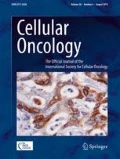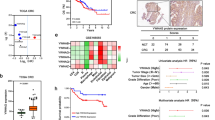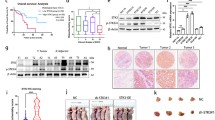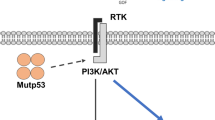Abstract
Purpose
Over half of the colon cancer patients suffer from cancer-related events, mainly metastasis. Loss of β-catenin activity has previously been found to facilitate cancer cell dissociation and migration. Here, we aimed to investigate whether epigenetic silencing of β-catenin induces human colon cancer cell migration and/or invasion.
Methods
HCT-116, Caco-2, HT-29 and SW620 cell migration and invasion capacities were assessed using scratch wound healing and Matrigel invasion assays, respectively. Confocal microscopy, qRT-PCR and Western blotting were performed to determine gene expression levels, whereas methylation-specific quantitative real-time PCR was used to assess the extent of β-catenin gene (CTNNB1) promoter methylation after treatment of the cells with TPA, hydrogen peroxide, 5-aza-2′-deoxycytidine and/or VAS2870.
Results
We found that treatment of HT-29 and Caco-2 cells (differentiated and low metastatic) with 12-O-tetradecanoyl phorbol-13-acetate (TPA; a tumor promoter) suppressed E-cadherin and β-catenin expression at both the mRNA and protein levels and, in addition, enhanced cell migration. Furthermore, we found that the CTNNB1 gene promoter methylation levels were higher in the more invasive HCT-116 and SW620 colon cancer cells than in HT-29 and CCD-841 (normal colon epithelial) cells. We also found that TPA or hydrogen peroxide induced CTNNB1 gene promoter methylation to a higher extent in HT-29 and CCD-841 cells than in HCT-116 and SW620 cells, and that the degree of CTNNB1 gene promoter methylation positively correlated with cell dissociation and migration. In addition, we found that co-treatment with 5-aza-2′-deoxycytidine (decitabine, a DNA methyl transferase inhibitor) and VAS2870 (a NADPH oxidase inhibitor) almost completely blocked the invasion of TPA-treated HT-29 and TPA-untreated HCT-116 and SW620 cells, and that these inhibitions surpassed those of the cells treated with decitabine or VAS2870 alone.
Conclusions
From our data we conclude that the extent of CTNNB1 gene promoter methylation by reactive oxygen species correlates with the migratory and invasive abilities of colon cancer cells. Our results suggest that epigenetic regulation of CTNNB1 may serve as a novel avenue to block colon cancer cell migration and invasion.





Similar content being viewed by others
Change history
07 August 2018
In the original version of above mentioned article an error occurred in Fig. 2. Panel g and panel h are included in the figure legend, but have not been published in the figure.
References
M. Yilmaz, G. Christofori, Mechanisms of motility in metastasizing cells. Mol Can Res 8, 629–642 (2010)
R. Paduch, The role of lymphangiogenesis and angiogenesis in tumor metastasis. Cell Oncol 39, 397–410 (2016)
S. Schmidt, P. Friedl, Interstitial cell migration: Integrin-dependent and alternative adhesion mechanisms. Cell Tissue Res 339, 83–92 (2010)
P. Devreotes, A.R. Horwitz, Signaling networks that regulate cell migration. Cold Spring Harb Perspect Biol 7, a005959 (2015)
L. Lobastova, D. Kraus, A. Glassmann, D. Khan, C. Steinhäuser, C. Wolff, N. Veit, J. Winter, R. Probstmeier, Collective cell migration of thyroid carcinoma cells: A beneficial ability to override unfavourable substrates. Cell Oncol 40, 63–76 (2017)
W. Meng, M. Takeichi, Adherens junction: Molecular architecture and regulation. Cold Spring Harb Perspect Biol 1, a002899 (2009)
W. Birchmeier, J. Hülsken, J. Behrens, Adherens junction proteins in tumour progression. Cancer Surv 24, 129–140 (1995)
T.T. Onder, P.B. Gupta, S.A. Mani, J. Yang, E.S. Lander, R.A. Weinberg, Loss of E-cadherin promotes metastasis via multiple downstream transcriptional pathways. Cancer Res 68, 3645–3654 (2008)
P.J. Morin, A.B. Sparks, V. Korinek, N. Barker, H. Clevers, B. Vogelstein, K.W. Kinzler, Activation of β-catenin-Tcf signaling in colon cancer by mutations in β-catenin or APC. Science 275, 1787–1790 (1997)
V. Korinek, N. Barker, P.J. Morin, D. Van Wichen, R. De Weger, K.W. Kinzler, B. Vogelstein, H. Clevers, Constitutive transcriptional activation by a β-catenin-Tcf complex in APC−/− colon carcinoma. Science 275, 1784–1787 (1997)
T. Li, Q. Lai, S. Wang, J. Cai, Z. Xiao, D. Deng, L. He, H. Jiao, Y. Ye, L. Liang, MicroRNA-224 sustains Wnt/β-catenin signaling and promotes aggressive phenotype of colorectal cancer. J Exp Clin Cancer Res 35, 21 (2016)
X. Tian, Z. Liu, B. Niu, J. Zhang, T.K. Tan, S.R. Lee, Y. Zhao, D.C.H. Harris and G. Zheng, E-cadherin/β-catenin complex and the epithelial barrier. Biomed Res Int 2011, 567305 (2011)
D. Kimelman, W. Xu, β-Catenin destruction complex: Insights and questions from a structural perspective. Oncogene 25, 7482–7491 (2006)
M.P.A. Ebert, J. Yu, J. Hoffmann, A. Rocco, C. Röcken, S. Kahmann, O. Müller, M. Korc, J.J. Sung, P. Malfertheiner, Loss of beta-catenin expression in metastatic gastric cancer. J Clin Oncol 21, 1708–1714 (2003)
Y. Miao, L. Wang, X. Zhang, X. Xu, G. Jiang, C. Fan, Y. Liu, X. Lin, J. Yu, Y. Zhang, Promoter methylation-mediated silencing of β-catenin enhances invasiveness of non-small cell lung cancer and predicts adverse prognosis. PLoS One 9, e112258 (2014)
F. Coppedè, Epigenetic biomarkers of colorectal cancer: Focus on DNA methylation. Cancer Lett 342, 238–247 (2014)
J. Yuan, N.L. Luceño, B. Sander, M.M. Golas, Synergistic anti-cancer effects of epigenetic drugs on medulloblastoma cells. Cell Oncol 40, 263–279 (2017)
M.S.G. Montani, M. Granato, C. Santoni, P. Del Porto, N. Merendino, G. D’Orazi, A. Faggioni, M. Cirone, Histone deacetylase inhibitors VPA and TSA induce apoptosis and autophagy in pancreatic cancer cells. Cell Oncol 40, 167–180 (2017)
M. Staberg, S.R. Michaelsen, R.D. Rasmussen, M. Villingshøj, H.S. Poulsen, P. Hamerlik, Inhibition of histone deacetylases sensitizes glioblastoma cells to lomustine. Cell Oncol 40, 21–32 (2017)
K. GrØnbÆk, C. Hother, P.A. Jones, Epigenetic changes in cancer. APMIS 115, 1039–1059 (2007)
P.M. Das, R. Singal, DNA methylation and cancer. J Clin Oncol 22, 4632–4642 (2004)
P.A. Jones, S.B. Baylin, The epigenomics of cancer. Cell 128, 683–692 (2007)
S.H. Lin, J. Wang, P. Saintigny, C.-C. Wu, U. Giri, J. Zhang, T. Menju, L. Diao, L. Byers and J.N. Weinstein, Genes suppressed by DNA methylation in non-small cell lung cancer reveal the epigenetics of epithelial–mesenchymal transition. BMC Genomics 15, 1079 (2014)
M. Esteller, Epigenetics in cancer. N Engl J Med 2008, 1148–1159 (2008)
D.C. Radisky, D.D. Levy, L.E. Littlepage, H. Liu, C.M. Nelson, J.E. Fata, D. Leake, E.L. Godden, D.G. Albertson, M.A. Nieto, Rac1b and reactive oxygen species mediate MMP-3-induced EMT and genomic instability. Nature 436, 123–127 (2005)
S. Banskota, S.C. Regmi, J.A. Kim, NOX1 to NOX2 switch deactivates AMPK and induces invasive phenotype in colon cancer cells through overexpression of MMP-7. Mol Cancer 14, 123 (2015)
S. Banskota, S.C. Regmi, J. Gautam, P. Gurung, Y.J. Lee, S.K. Ku, J.H. Lee, J. Lee, H.W. Chang, S.J. Park, J.A. Kim, Serotonin disturbs colon epithelial tolerance of commensal E. Coli by increasing NOX2-derived superoxide. Free Radic Biol Med 106, 196–207 (2017)
K. Mori, M. Shibanuma, K. Nose, Invasive potential induced under long-term oxidative stress in mammary epithelial cells. Cancer Res 64, 7464–7472 (2004)
Q. Wu, X. Ni, ROS-mediated DNA methylation pattern alterations in carcinogenesis. Curr Drug Targets 16, 13–19 (2015)
M. Esteller, CpG island hypermethylation and tumor suppressor genes: A booming present, a brighter future. Oncogene 21, 5427–5440 (2002)
R. Franco, O. Schoneveld, A.G. Georgakilas, M.I. Panayiotidis, Oxidative stress, DNA methylation and carcinogenesis. Cancer Lett 266, 6–11 (2008)
S.O. Lim, J.M. Gu, M.S. Kim, H.S. Kim, Y.N. Park, C.K. Park, J.W. Cho, Y.M. Park and G. Jung, Epigenetic changes induced by reactive oxygen species in hepatocellular carcinoma: Methylation of the E-cadherin promoter. Gastroenterology 135, 2128–2140 (2008)
T. Ikenoue, H. Ijichi, N. Kato, F. Kanai, T. Masaki, W. Rengifo, M. Okamoto, M. Matsumura, T. Kawabe, Y. Shiratori, Analysis of the β-catenin/T cell factor signaling pathway in 36 gastrointestinal and liver Cancer cells. Cancer Sci 93, 1213–1220 (2002)
M. Ilyas, I. Tomlinson, A. Rowan, M. Pignatelli, W. Bodmer, β-Catenin mutations in cell lines established from human colorectal cancers. Proc Natl Acad Sci U S A 94, 10330–10334 (1997)
D. Ahmed, P. Eide, I. Eilertsen, S. Danielsen, M. Eknaes, M. Hektoen, G. Lind, R. Lothe, Epigenetic and genetic features of 24 colon cancer cell lines. Oncogenesis 2, e71 (2013)
B.C. Park, D. Thapa, Y.S. Lee, M.K. Kwak, E.S. Lee, H.G. Choi, C.S. Yong, J.A. Kim, 1-furan-2-yl-3-pyridin-2-yl-propenone inhibits the invasion and migration of HT1080 human fibrosarcoma cells through the inhibition of proMMP-2 activation and down regulation of MMP-9 and MT1-MMP. Eur J Pharmacol 567, 193–197 (2007)
S.C. Regmi, S.Y. Park, S.K. Ku, J.A. Kim, Serotonin regulates innate immune responses of colon epithelial cells through Nox2-derived reactive oxygen species. Free Radic Biol Med 69, 377–389 (2014)
O. Tetsu, F. McCormick, Beta-catenin regulates expression of cyclin D1 in colon carcinoma cells. Nature 398, 422–426 (1999)
T. Brabletz, A. Jung, S. Dag, F. Hlubek, T. Kirchner, β-Catenin regulates the expression of the matrix metalloproteinase-7 in human colorectal cancer. Am J Pathol 155, 1033–1038 (1999)
B.P.L. Wijnhoven, W.N.M. Dinjens, M. Pignatelli, E-cadherin-catenin cell-cell adhesion complex and human cancer. Br J Surg 87, 992–1005 (2000)
J. Theys, B. Jutten, R. Habets, K. Paesmans, A.J. Groot, P. Lambin, B.G. Wouters, G. Lammering, M. Vooijs, E-cadherin loss associated with EMT promotes radioresistance in human tumor cells. Radiother Oncol 99, 392–397 (2011)
Y. Wang, J. Shi, K. Chai, X. Ying, B.P. Zhou, The role of Snail in EMT and tumorigenesis. Curr Cancer Drug Targets 13, 963–972 (2013)
J.R. Graff, J.G. Herman, R.G. Lapidus, H. Chopra, R. Xu, D.F. Jarrard, W.B. Isaacs, P.M. Pitha, N.E. Davidson, S.B. Baylin, E-cadherin expression is silenced by DNA hypermethylation in human breast and prostate carcinomas. Cancer Res 55, 5195–5199 (1995)
A.O. Chan, S.K. Lam, B.C. Wong, W.M. Wong, M.F. Yuen, Y.H. Yeung, W.M. Hui, A. Rashid, Y.L. Kwong, Promoter methylation of E-cadherin gene in gastric mucosa associated with helicobacter pylori infection and in gastric cancer. Gut 52, 502–506 (2003)
S.Y. Shin, C.G. Kim, E.H. Jho, M.S. Rho, Y.S. Kim, Y.H. Kim, Y.H. Lee, Hydrogen peroxide negatively modulates Wnt signaling through downregulation of β-catenin. Cancer Lett 212, 225–231 (2004)
Acknowledgements
This work was supported by the National Research Foundation of Korea (NRF) funded by the Korean Ministry of Science and ICT (grant no. NRF-2017R1E1A1A01073590), and by a Yeungnam University research grant (2017).
Author information
Authors and Affiliations
Corresponding author
Ethics declarations
Conflict of interest
The authors have no conflict of interest to declare.
Additional information
The original version of this article was revised: In the original version of the online published article figure 2 is incomplete. Panel g and panel h, as included in the figure legend, were not published in the figure. The correct version of figure 2 can be found in the revised article and erratum.
Rights and permissions
About this article
Cite this article
Banskota, S., Dahal, S., Kwon, E. et al. β-Catenin gene promoter hypermethylation by reactive oxygen species correlates with the migratory and invasive potentials of colon cancer cells. Cell Oncol. 41, 569–580 (2018). https://doi.org/10.1007/s13402-018-0391-7
Accepted:
Published:
Issue Date:
DOI: https://doi.org/10.1007/s13402-018-0391-7




